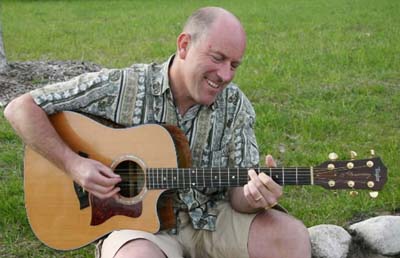
(RNS1-FEB27) Toby Jones is a Presbyterian pastor in Michigan and author of the book, “The
Gospel According to Rock.” For use with RNS-10-MINUTES, transmitted Feb. 27, 2008. Religion
News Service photo courtesy of Toby Jones.
LOS ANGELES (RNS) British commercial director and photographer Peter Rodger is making his feature film debut with “Oh My God,” a 98-minute documentary that features interviews with rank-and-file people and celebrities such as Hugh Jackman, Seal and Ringo Starr, who are all asked the same question: “What is God?”
The film is making the rounds on the film festival circuit; screening dates and locations of screenings are available on the film’s Web site, http://www.omgmovie.com.
Rodger spoke about maintaining objectivity, his own beliefs and overcoming fear. Some answers have been edited for length and clarity.
Q: What was the impetus to make this film?
A: I was frustrated with the childish, school-yard mentality that permeates this world. It really pushed me to look at what this entity that goes by the name of God means to people. Here we are in the 21st century, in a technologically advanced time, and you have grown men flying airplanes into buildings, shouting “God is Great.” You have a leader of the free world saying he invaded Iraq because God told him to. You have young men and women blowing themselves up to buy themselves a place in heaven. I decided to go around the world, so that perhaps we might learn something from it.
Q: Why was your main question, “What is God?”
A: I decided to ask “What is God?” rather than “Who is God?” so I could be a little more objective. It takes out the idea of God being an image of man. It’s like looking at it from the outside-in, rather than the inside-out. When you ask the question, “Hello, What is God?”, people kind of step back. The result is something very spontaneous.
Q: How did you get your interview subjects to open up?
A: I think people really want to. A lot of people are as frustrated as I am about this whole situation that is permeating this world. They like somebody coming to them and asking them what they think God is. The celebrities are in the film because they help, as a known face, to guide people through.
Q: What role did your own spirituality have in the making of the film?
A: I am a spiritual person, and I do believe in the essence of power that binds everybody together. I was a little bit wary of religion because of its politicized nature that sometimes causes conflict around the world, as well as very good things. It was literally a searching thing for me. It was also maybe my way of reconnecting with the world, trying to look at life and draw on what I am.
Q: Why didn’t you interview “big” religious leaders like the pope or Dalai Lama.
A: Because they are professional God people. They, of course, will tout their party line, and we’ve heard that before. I wanted to hear about what people felt about God on the streets, from all walks of life. Celebrities aren’t paid for, and don’t live their life working day-by-day for, a religion. I wanted to see, in a natural sort of way, what people felt on a social basis, not a political basis.
Q: Were you afraid while interviewing certain subjects, like militants?
A: When talking to people face-to-face and looking them in the eye, I didn’t have any fear at all. This might be complete and utter naivety, and I’m sure a lot of it was. When I was talking to people who have probably done nasty things to other human beings, I didn’t fear that sort of humanity. I was actually talking to them objectively about their belief systems. They were honest and receptive. I found that kind of magical, actually.
Q: What do hope viewers will take away from the film?
A: To be more tolerant of other people who have different beliefs, and to understand that we are much more united on this planet than we are divided. We’re in this together: most of us have two eyes, two arms and two legs and we’re very similar. Let’s celebrate the things that unite us, and not be angry with those who don’t think the same way we do.




